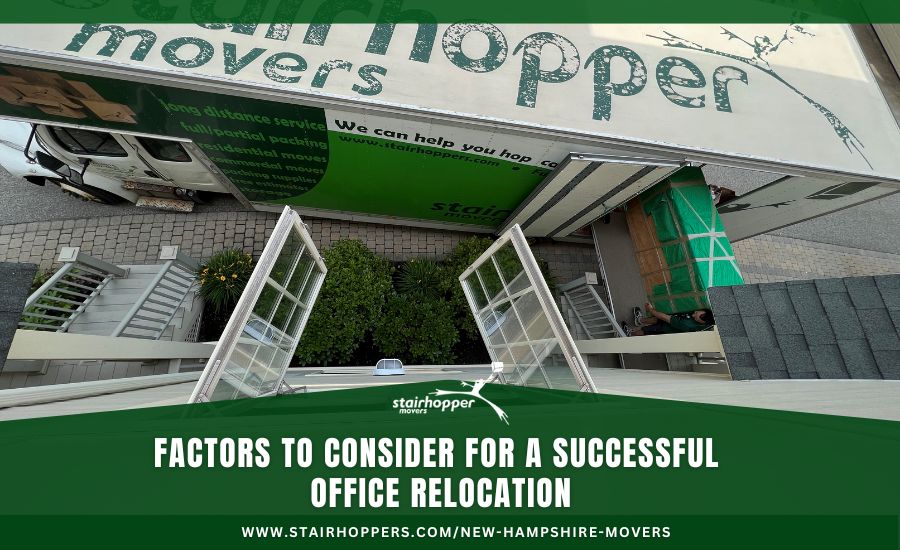Factors to Consider for a Successful Office Relocation

Relocating an office is a significant undertaking that requires careful planning and consideration. Whether you’re moving to a new building or transitioning to a different location, several factors need to be taken into account to ensure a successful office relocation. This article highlights key factors that businesses should consider when embarking on an office move. By understanding and addressing these crucial elements, organizations can navigate the challenges of an office relocation more effectively and maximize the benefits of the transition.
List of Things to Consider for an Office Relocation
When it comes to relocating an office, careful planning and organization are essential to ensure a smooth and successful transition. Moving to a new office space can be a significant undertaking, requiring attention to numerous details to minimize disruptions and maintain productivity. Here’s a list of important factors to consider when embarking on an office relocation:
Financial Plan
Before embarking on an office relocation, it is crucial to develop a comprehensive financial plan. Evaluate the costs associated with moving, including packing materials, transportation, temporary storage, and any necessary renovations or upgrades at the new location. Having a well-defined budget will help you make informed decisions throughout the relocation process.
Planning and Implementation of Office Design
When moving to a new office space, it’s essential to plan and implement an efficient office design. Consider the layout and flow of the workspace, ensuring it meets the needs of your employees and supports productivity. Allocate space for various departments, meeting rooms, common areas, and storage. Efficient office design can improve collaboration and optimize workflow.
Internal and External Communication Process
Maintaining effective communication during an office relocation is crucial. Develop a communication plan to keep employees, clients, vendors, and other stakeholders informed about the move. Ensure that everyone is aware of the timeline, address, and any changes that may impact their work. Clear and timely communication will help alleviate any concerns and ensure a smooth transition.
Furniture and Fixtures for the Office Environment
Evaluate your current furniture and fixtures and determine what needs to be replaced, repaired, or upgraded. Consider the new office space’s dimensions and layout to ensure that your furniture fits appropriately. Invest in ergonomic furniture that promotes employee comfort and well-being, as it can enhance productivity and reduce workplace injuries.
Network Connections and Data-Related Assets
In today’s digital age, a seamless network connection is vital for business operations. Ensure that your new office space is equipped with reliable internet connectivity and sufficient bandwidth to handle your company’s needs. Plan the relocation of data-related assets, such as servers, carefully to avoid data loss or downtime. Engage IT professionals to handle the setup and ensure a smooth transition of your digital infrastructure. Here’s a list of important equipment that you need to consider bringing into your new office:
- Desktops: When relocating your office, carefully handle and pack desktop computers to prevent any damage. Label cables and wires to ensure easy reconnection at the new location. Consider hiring professionals to disassemble and reassemble complex IT equipment to avoid any mishaps.
- Data Centers & Servers: Data centers and servers are the backbone of many businesses. Ensure proper planning and coordination for their relocation. Make sure to back up critical data and have a strategy in place for seamless server migration to minimize downtime.
- Leased Equipment: If your office has leased equipment, such as printers or copiers, inform the leasing company about the relocation plans. Arrange for their pickup or return according to the lease agreement. Ensure that all leased equipment is properly packed and labeled for easy identification during unpacking.
- Telephones: Coordinate with your telephone service provider to transfer or set up phone lines at the new location. Update your business contact information to avoid any communication disruptions. Test the phone lines to ensure they are functioning correctly after the relocation.
- Internet Connections: Contact your internet service provider well in advance to schedule the transfer of your internet connection to the new office space. Ensure that all network equipment, such as routers and switches, is properly packed and labeled. Test the internet connection upon completion of the move to ensure a smooth transition.
Disposal of Outdated or Unnecessary Office Equipment
Moving to a new office is an excellent opportunity to declutter and dispose of outdated or unnecessary office equipment. Consider recycling or donating items that are no longer in use. Properly dispose of electronic waste by local regulations. By minimizing unnecessary items, you can streamline your relocation process and optimize your new workspace.
Comprehensive Plan for Moving the Office
To ensure a successful office relocation, create a comprehensive plan that outlines all the necessary steps and timelines. Assign responsibilities to team members and establish a clear chain of command. Develop a checklist to keep track of essential tasks and ensure nothing is overlooked. Regularly review the progress of the move and make adjustments as necessary.
Let Stairhopper Movers Handle Your Office Relocation
Office relocations require careful planning and execution to minimize disruptions and ensure a seamless transition. Consider hiring professional office movers in New Hampshire like Stairhopper Movers to handle your relocation. With our expertise and experience, we can efficiently pack, transport, and set up your office equipment and furniture, allowing you to focus on your business operations.
FAQs: Office Relocation
How far in advance should I start planning my office relocation?
It’s advisable to start planning your office relocation at least three to six months in advance to allow sufficient time for preparation and coordination.
Do I need to inform my clients and vendors about the office relocation?
Yes, it’s essential to inform your clients and vendors about the upcoming office relocation to minimize any disruption in your business operations.
How can I ensure the safety of my data during the office relocation?
Back up your critical data and coordinate with your IT department or service provider to ensure a secure transfer of servers and data centers.
Can I relocate my office during weekends or after working hours to minimize downtime?
Yes, scheduling the move during weekends or after working hours can help minimize downtime and reduce the impact on your business operations.
How can professional office movers help with the relocation process?
Professional office movers have the expertise and resources to handle the logistics of your office relocation, ensuring a smooth and efficient transition.


